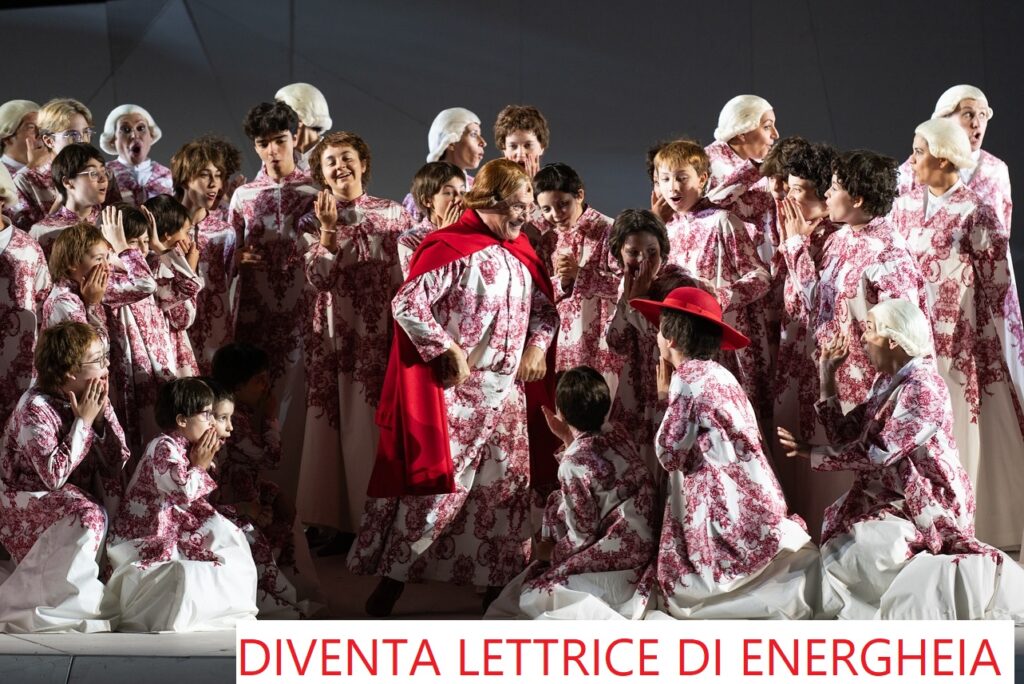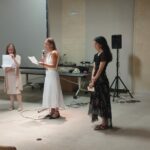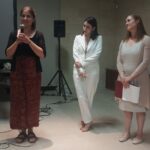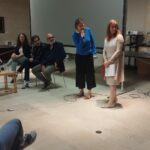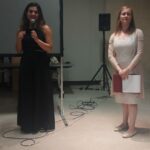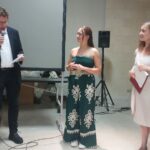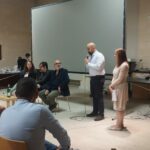Bride Immaculate_Merav Fima, Omer(Israel)
_ Winner Energheia Israel Prize 2014.
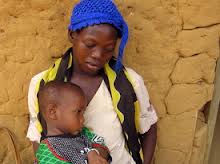 She warned me that he would abandon me, that he would be as unfaithful to me as I had been to my vows, but I could not be untrue to my heart’s calling. And though he did leave me, it wasn’t for the reasons she had envisioned. I know he would have stayed, had he not been forced to flee.
She warned me that he would abandon me, that he would be as unfaithful to me as I had been to my vows, but I could not be untrue to my heart’s calling. And though he did leave me, it wasn’t for the reasons she had envisioned. I know he would have stayed, had he not been forced to flee.
But that was over half a century ago. The year was 1948; I was sent, aged 27, from my French hometown to the Holy Land, to a remote village amid the Judean Hills, to join the Notre-Dame de Sion congregation and help cure the ailing Sisters from a severe outbreak of the influenza – having been identified by the Superior of my local abbey as knowledgeable in herbs and natural remedies, a skill inherited from my Provençal mother.
That winter, the nights of Jerusalem were frigid and I found myself shivering as I lay in bed under the single woollen quilt, kept awake by the shrieking wind carrying with it the call of the muezzin, unable to fall asleep even after repeating the rosary ad nauseam. But when the sun broke through the clouds at midday, its warmth would caress me and I yearned to throw myself into its beckoning arms. Lonely in the Abbey, where I alone still walked on my own two feet among the ill Sisters and where all scheduled prayers and activities had come to a standstill, I breached its iron gates to explore the adjacent hills, pleading that the Abbey garden could not supply all of the plants needed to concoct the desired remedy; and I, therefore, had no choice but to seek wild herbs beyond its crenellated stone walls. As Mother Superior was herself confined to bed with excruciating muscular pain and hallucinations and in dire need of my promised elixir, there was no one to question my prolonged absences or to forbid me from wandering to my heart’s content.
It was on one of those sojourns to a terraced hillside, as far away from the Abbey as I could reach, that I met him. I must have been drawn to the music soaring from his reed flute, stupefying the black sheep lying in a daze on the grass around him. I had, on previous occasions, spotted those same sheep skipping – wild with joy – from hill to hill, but the music, like a tranquilizer, sedated them as they lolled on their backs in the sun. Identifying a tree bark wide enough to conceal me from his sight, I removed my white apron, spread it over a patch of wild grass, lay down, and closed my eyes, allowing his music to take me on an enchanted journey to distant lands. I hadn’t heard music (except for organ and harpsichord accompanying the choral chanting of hymns) since devoting myself to God at the age of 14, and had certainly never heard music of this kind before – its exotic cadences sent a shiver down my spine, lulling me to sleep – a more profound sleep than I had enjoyed in all the weeks since arriving in Ein Kerem.
I awoke to find the man leaning over me; from my vantage point on the ground his torso seemed to extend to the height of the pine trees. He smiled when he realized how startled I was, a smile that revealed a row of pearly white teeth glowing in contrast to his caramel-toned skin; a smile reiterated by the warmth and kindness of his dark eyes. He extended his muscular arms to me – his hands rough on the outside but soft within – gently lifting me to my feet as though I were an injured lamb. Enthralled by his presence, thrilled by his touch, I suddenly noticed my apron still on the ground – stained green and brown from the humid grass – and bent over to retrieve it. He reached it first and, instead of handing it to me, let it drape over his forearm.
Placing a soothing hand on my back he led me to a secluded spot under the luscious pomegranate tree, near an elusive brook, murmuring “Habibti,” a word I could not understand. But any sound emitted by his deep, melodious voice, no matter its meaning, would have been pleasing to my ears. I longed to lean into him, to rest my head on his shoulder, and my lips somehow brushed his. I had never before felt a man’s breath against my cheek, had never before felt so safe.
Only the chiming church bells recalled me from my reverie. I spun around and detached my body from his, pricking my exposed ankle on a thorn from the rosebush that had, until then, enfolded us in its exquisite fragrance.
***
I returned the next day and the next to find him lounging in the same spot, fluting his hypnotic melody.
Though thoroughly distracted by our encounter, I somehow managed to concoct the trusty lemon-honey-thyme syrup. One by one, the Sisters returned to their duties and sacred worship, and my free time was once again restricted. Mother Abbess, who had promoted me from Novice to the rank of Infirmerer in recognition of my contribution to the community’s recovery, now gave me a sour look whenever she’d catch me daydreaming during her sermon or a slap on the wrist if I doodled instead of transcribing the day’s hymn.
She finally sent her deputy after me while I went out into nature one day. I will never forgive that spy of hers, forever depriving me of my one chance at true happiness, envious that her own prime had passed unfulfilled. If not for her, we could have continued enjoying our midday embraces undisturbed.
***
The harsh winter had somehow mellowed by the time Mother Abbess called me to her study. More and more flowers blossomed with each passing day, birds just back from their southern expedition cheerfully chirped, and the sun shone brighter. Almond trees adorned with fragrant flowers, like majestic brides, proclaimed the arrival of spring. We felt so secure amid their snow-white blossoms, forgetting that they could not camouflage us – he in his white galabiyah and I in my starched black robe.
“Sit down, my child,” she commanded when I stepped into her office with a curtsy. “Is there anything you would like to confess?” She examined me over the rim of her glasses, her green eyes magnified by the thick lenses.
Lowering my eyes, I muttered something about devoting more time lately to nature study than to the Holy Scriptures.
“By ‘nature study’ I take you to mean the exploration of bodily impulses and desires.” I blanched; how could she possibly have discovered my most intimate secret?
She rose from her seat on the other side of the desk, strode across the room, and pressed a heavy palm into my shoulder.
“You have committed a most serious transgression in your lust for another human being and infidelity toward our Heavenly Father. You must repent, make penance for your carnal sins, and retake your sacred vows; otherwise you will have to leave the Abbey and fend for yourself.”
She walked me through the long, sombre corridor to my cell – bare white walls with a wooden crucifix as their sole adornment, overlooking a narrow wrought-iron bed, a wooden desk and chair, and a porcelain wash basin. My only comfort was the window, framing the Abbey’s orchard, replete with olives, figs, pomegranates, and vines.
Tears rolled down my cheeks as I threw myself onto the stiff bed and heard the key turning in the lock; I did not know whether they were tears of longing for my beloved or tears of despair at the harshness of my fate and the difficulty of the situation with which I was now faced.
I spent the next two weeks in a dazed sleep, interrupted only by the occasional gunshot, which I supposed to be a mark of celebration among the villagers. I only hoped that my beloved would clasp no other woman to his bosom during the celebratory dance, frustrated by my prolonged absence.
When Mother Abbess entered my cell bearing my daily portion of bread and water, I rose to face her for the first time in fifteen days. My feet barely held me, so weakened was I by my near starvation.
“I beg your pardon, Mother, but have no choice but to leave the Order and pursue my passion.”
“It is, of course, as you wish, my dear, but mark my words, he will abandon you yet and true happiness will continue to elude you if you step beyond our walls. I hope you have considered your options carefully.” I kissed her outstretched hand, grabbed my woollen black cloak, and exited the claustrophobic chamber with a curtsy.
***
I had lost all track of time and everything beyond the monastery’s crenellated stone walls seemed oddly dark and dreary, in sharp contrast to the lushness of the Abbey garden and the fervent activity of the Sisters working the land. I did not look up as I crossed the garden, but from the corner of my eye saw one of the nuns flashing me a derisive smile. I knew at that moment that she had been the informant.
I was astonished at the stillness of the streets, usually so colourful and lively with the joyful cries of children at play and of bleating goats. The greater the distance I covered, the more the village appeared to me deserted. It was then that I realized I hadn’t even heard the muezzin for the past few days. This impression was intensified when I reached the stone house with the blue door, where I knew my beloved to live.
The clothesline, always overloaded with robes and linens hanging in the sun to dry, was completely bare and the henhouse empty. The dignified house stood still. No flute music emerged from within and no one sat drinking cardamom-spiced coffee while playing backgammon on the arched veranda. No one answered the door, even after repeated knocks gradually crescendoing in their urgency. At first I was relieved; what would I say to his mother or sisters if they found me standing there? How would I explain our relationship? Or even worse – what if his father, the Sheikh, opened the door, expecting one of his disciples for a tutorial? At least I would not look out of place in the dark cloak thrown over my shoulders, complemented by a white headscarf. Perhaps I could claim that I had been invited to examine their livestock and administer a new vaccine against hoof-and-mouth disease?
I finally grew impatient and pushed the door open. The interior was just as still as the exterior. Embroidered cushions were strewn on the floor, books and papers dispersed all over the Persian carpet, and glasses stained mud brown stood on the low damascene coffee table. There was no sign of humanity.
I collapsed onto one of the silk cushions, embroidered with golden threads, and started weeping in my loneliness and despair. I then fell into a prolonged stupor, I know not how long, and awoke to the sound of soldiers yelling orders under the window. A pair in mismatched, badly fitting uniforms rapped the door with the butt of a gun, which they pointed at me when I had gathered enough strength to rise to my feet and answer the door. I raised my hands in total submission. After they had lowered the weapon, I somehow managed to comprehend from their hand gestures that all of the village’s inhabitants had fled three days before – cleared every house overnight and rejoined their relatives in Jordan, Lebanon, or Syria – and the warriors had now come to take any remnant captive. It was then that I realized that, just as Mother Abbess had predicted, my beloved really had abandoned me; definitely not for the reasons she had envisioned (unless she had known about the evacuation and concealed the news from me), but abandoned me nonetheless.
I tried explaining to the soldiers that I had belonged, up to a few hours before, to the nearby Abbey and was of French Catholic origin, with no interest in the war and no desire to support or hinder either side. I then had the insight that would save my life: I told the soldiers about my expertise in natural remedies and my pharmaceutical skills, and offered to establish a clinic in that very house, perhaps a branch of the Red Cross, in order to treat anyone wounded in battle. The soldiers surveyed the house and nodded their approval. As the Sheikh’s home, it was quite spacious, with many rooms for different types of injuries and diseases.
The arrangement suited me, as it kept me occupied during the months in which fire was exchanged between the Jews and the Arabs. I was glad to remain in my beloved’s home, hopeful that he would return with the culmination of the war and marry me, as a reward for my patience and unwavering devotion – finally granting me the long-lasting happiness I yearned for.
While anticipating the arrival of my first patients, I prepared the house and put the rooms in order, immersing myself in family albums, imagining what our children would look like, and soaking the pillows on which he himself had slept with rose water adulterated with my own tears. I stroked his musical instruments, considering them too sacred to blow, and inhaled his distinct scent from the embroidered robes still hanging in the closet, worshipping the painted ceramic tiles on which he had stepped.
But he never did return. Several months later, Israeli independence was declared and those same soldiers, now bearing badges of honour, returned to evict me from my beloved’s former residence, claiming that the house was now needed to settle Jewish immigrants who had been expelled from Arab countries and European Holocaust survivors. I had no choice but to return to France and lead a peaceful but solitary life in my hometown, tending to all those in misery.
***
I have now returned on a final pilgrimage to the Holy Land. Though I have given up all hope of ever seeing him again, I cannot help but wonder if he would recognize me, all bent and wrinkled as I am today. And though the Ein Kerem landscape has remained much the same, the houses appear dilapidated and the blue paint on the door and window frames has started peeling away. Yet, despite the deterioration, it is now an exclusive neighbourhood long since annexed to Jerusalem’s municipal boundaries, inhabited by artists in search of inspiration.
And that same virginal spot where we first embraced – flourishing each year anew with the progeny of those original pomegranates, wild roses, and almond blossoms – has been discovered and appropriated by countless lovers since.


